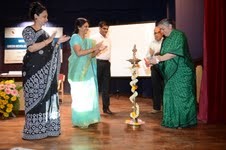Symbiosis Law School, Pune
(30thMarch ‘13)
Symbiosis Law School, Pune, the constituent of Symbiosis International University, Pune, in its quest for gaining legal excellence, successfully organized the “Biodiversity Meet 2013”on Green Revolution and Gene Revolution at the Vishwabhavan Auditorium.

Dr. Vandana Shiva, Founder, Navdanya & the Research Foundation for Science, Technology and Ecology, was the chief guest for the occasion.The other eminent speakers on the dais were Dr. Chittranjan Bhatia, former Secretary, Department of Biotechnology, Government of India and Adv. Yeshwanth Shenoy, legal advisor to various Regulatory Authorities, Government of India.
The dignitaries were greeted by Dr. Shashikala Gurpur, Fulbright Scholar, Director, Symbiosis Law School and Dean, Faculty of Law, Symbiosis International University, Pune. In her welcome address, she referred to Dr. Vandana Shiva as being a “teacher of teachers”, stating how she usually startsher biotechnology lectures by showing Dr. Vandana’shighly interesting and inspiring videos. She drew attention on the fact how in the 1980’s, the forerunners in the newly emerging prospect of biodiversity were women such as MedhaPatkar and Dr. Vandana Shiva herself, highlighting the fact of eco-feminism whereby women played a crucial role in bringing to light ecological issues. She spoke of her belief that today’s meet would be an inter-disciplinary approach to critical thinking on genetic issues, in which Symbiosis Law School, Pune, would assume a leading role in the near future.
.jpg)
Dr. Gurpurfurther,felicitated Dr. Vandana Shiva,Dr. Chittranjan Bhatia and Adv. Yeshwanth Shenoy, respectively.
The first speaker of the meet, Dr. Vandana Shiva, started with how, over the years, Genetically Modified crops had got to be associated with adverse effects on human health. It was at this juncture that the concept of Genetically Engineered crops arose, which had no pernicious effect on human health owing to the Recombinant DNA technology used to produce them. Dr. Vandana Shiva elaborated on how Genetic engineering is not a replacement to Green Revolution but just an addition to it with the sole purpose of increasing production and to limit the use of chemical pesticides. Throughout her impressive speech she stressed on the fact of how the idea of genetic engineering leading to an increase in food for human consumption was a myth, taking the example ofhow only 10% of Soya produced globallyis consumed and the rest 90% is used for bio fuels. She concluded that people have become too much dependent on technology and are hence ignorant towards the ill effects of genetically modified food, often the case being that natural products are many times richer in nutrients than genetically modified crops.
.jpg)
Dr. Chittranjan Bhatia spoke on how themost appropriate gene is selected from all the available genes in the gene pool to produce the best variety of crops which are superior in terms of both quality and production quantity, to suit Man’s tastes. He elaborated on the statistics of BT Cotton production in India, to highlight on the fact that its production was solely for the purpose of increased profits and not quantity. He next focussed on the opposition to GE crops arising primarily due to the fears of the farmers that their traditional crops would be replaced in the market by GE crops leading to losses, and because of ethical issues arising out of human conscience that no mortal being should be allowed to interfere with the creations of nature. He concluded that as long as GE crops were approved by regulatory authorities, they could be safely grown and consumed as any other crop grown by traditional means.
Adv. Yeshwanth Shenoy threw light on the fact that how a question to choose between Genetically Modified food and Genetically Engineered food did not matter for those who could not manage a day’s meal. In a country like India where more than 60% of the population is below poverty line, the government must first ensure food security which involves physical and economic access to good quality food. He opined Genetically Modified foods for that purpose are merely “money-spinners” that play on the hard earned money of the commons to deprive them of their right to good quality food. He foresaw how the next Green Revolution would be decided by lawyers in a courtroom and not by the scientist, as it was law that had warranted for the branding of food produced through biotechnology in a nation where proper food was not available to 60% of the population, and it would be law that would unwind this knot.
Adv. B.R. Ranade was also present to grace the occasion.Overall, the Biodiversity Meet on “Green Revolution to Gene Revolution” was an enriching experience that encouraged the audience to think for the oppressed farmers and work towards their cause.
Join LAWyersClubIndia's network for daily News Updates, Judgment Summaries, Articles, Forum Threads, Online Law Courses, and MUCH MORE!!"













